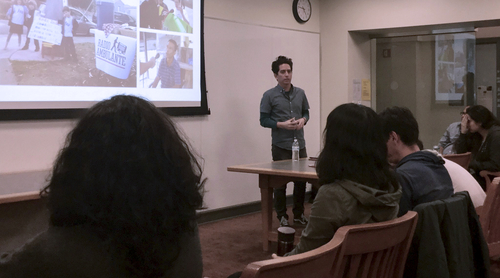In the United States, audio storytelling is experiencing a renaissance. The latest wave of sophisticated podcasts cover stories on everything from true crime to architecture to imaginary worlds. Instead of just recreating radio for the digital age, podcasting is expanding and rewriting the type of stories that can be told in sound.
On Tuesday, February 7, the Brown Institute hosted Daniel Alarcón, the creator of one of these podcasts, to talk at Stanford about how he tells true stories in audio. His podcast, Radio Ambulante, started with the ambitious premise of being the Spanish-speaking “This American Life.” Since it began as a Kickstarter campaign in 2012, Radio Ambulante has gained an audience across the Americas, and is now the first Spanish-language podcast distributed by NPR. In 2014, it received the Gabriel García Márquez Prize for Innovation in Journalism, a highly prestigious journalism honor in Latin America.
In his talk, Alarcón laid out the challenges of starting a podcast from scratch. As a novelist, Alarcón had to relearn how to tell stories for radio, altering his pacing and changing the way he asked conducted interviews. The Radio Ambulante team, which is scattered across North and South America had to find ways to communicate effectively and efficiently across thousands of miles of separation. They had to find ways to normalize slang across countries, to be able to tell global stories in Spanish. There was also the challenge of reaching an audience in Latin American, which doesn’t have the same ecosystem of podcasts as the U.S.
However, Alarcón considers his timing lucky. Google Docs, Dropbox and other collaboration tools were becoming widespread in 2012, allowing remote teams to share and cooperate on all stages of production.
“Radio Ambulante got started just as the technology needed to tell these stories came online,” he said.
Now, Alarcón is hoping Radio Ambulante can expand its audience in innovative ways. Right now, the podcast’s audience is about one-third Latin American, one-third Latino in the U.S., and one-third non-Latino in the U.S. This was a surprise to Alarcón, who expected most of his listeners to be from Latin American countries.
Through research, he said, “We learned that lots of people in the U.S. are using Radio Ambulante to learn Spanish.”
He hopes to reach more of this demographic by creating curriculum around the podcast so that teachers can use the stories in the classroom.
Alarcón came to Stanford as part of the Brown Institute’s Winter Speaker Series. The next speaker in the series will be Martin Baron, Executive Editor of the Washington Post. For tickets to this event on February 21, click here.
In anticipation of his talk, the Brown Institute will also host a screening of Spotlight on February 15 at 5pm. RSVP for that screening here.

